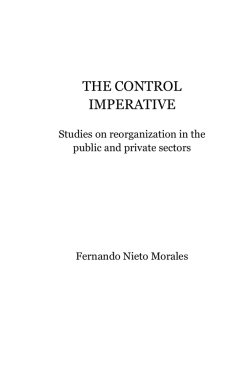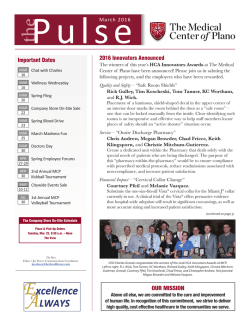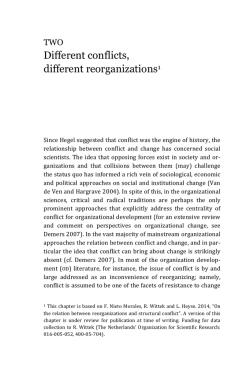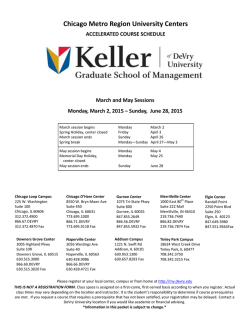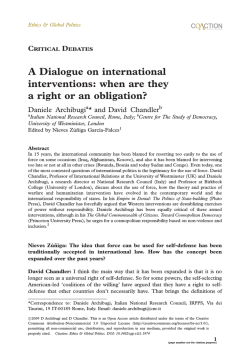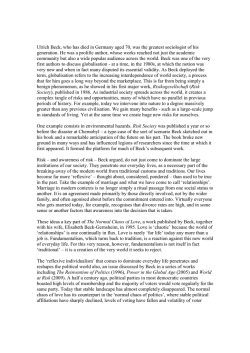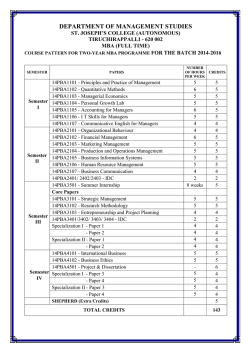
The control imperative FINAL (digital)
! ! ONE Managerial gattopardism1 ! ! ! ! ! ! ! Decades! of! research! on! organizational! change! show! that! top! managers! vary! considerably! in! their! inclination! to! launch! reor< ganizations,! that! is,! intentional! changes! in! organizational! struc< tures!and!internal!policies.!Whereas!many!top!executives!launch! some! kind! of! reorganization! within! their! first! two! years! on! the! job! (more! than! 50%! according! to! Blenko,! Mankins! and! Rogers! 2010;!also!see!Boeker!1997),!others!often!actively!resist!change! (Agócs! 1997;! Mabey! and! Mayon<White! 1993;! Muurlink,! Wil< kinson,! Peetz! and! Townsend! 2012;! Palmer,! Dunford! and! Akin! 2009;! Pfeffer! 1992).! Why' do' some' top' managers' eagerly' initiate' reorganizations,' whereas' others' actively' avoid' or' resist' them?! Answering! this! question! is! not! only! relevant! for! understanding! the! role! of! top! managers! in! enabling! reorganizations.! It! is! also! relevant! for! understanding! why! some! organizations! fail! to! im< plement!necessary!changes!in!dysfunctional!structures!and!pro< cesses! (Staw,! Sandelands! and! Dutton! 1981),! whereas! others! spend! valuable! resources! in! risky! reorganizations! that! often! bring!about!more!problems!than!solutions!(Palmer,!Dunford!and! Akin!2009).! ! 1!This!chapter!is!based!on!F.!Nieto!Morales,!R.!Wittek,!P.!Hindriks!and!L.!Heyse.! 2014,! “Managerial! gattopardism:! Why! managerial! control! inhibits! reorganiza< tions”.! A! revised! version! is! under! review! for! publication! at! time! of! writing.! Funding! for! data! collection! to! R.! Wittek! (The! Netherlands’! Organization! for! Scientific!Research:!016<005<052,!400<05<704).! ! ! MANAGERIAL!GATTOPARDISM! ! ! A! central! proposition! of! strategic! management! research,! particularly! upper! echelons! theory! (Finkelstein! and! Hambrick! 1990;! Finkelstein,! Hambrick! and! Canella! 2009;! Hambrick! 2007;! Hambrick! and! Mason! 1984)! is! that! top! managers! play! a! crucial! role! in! bringing! about! strategic! change! (see! also,! Westphal! and! Friedrickson! 2001).! A! considerable! body! of! empirical! research! seems! to! support! this.! Strategic! management! studies,! for! exam< ple,! show! that! CEO’s! professional! experience! predicts! the! likeli< hood! and! orientation! of! changes! (Finkelstein! and! Hambrick! 1996).! Others! show! that! top! executive! tenure! is! a! predictor! of! commitment!to!uphold!the!status!quo!and!a!deterrent!to!strate< gic!change!(Hambrick,!Geletkanycz!and!Fredrickson!1993).!More! recently,! Waldman,! Javidan! and! Varella! (2004)! found! that! man< agers’! charismatic! leadership! is! associated! with! objective! and! subjective! indicators! of! strategic! change,! and! Vera! and! Crossan! (2004)!make!a!case!for!the!influence!of!corporate!leadership!on! broader!processes!of!organizational!development.! ! However,! as! pointed! out! already! by! Hambrick! (2007,! 335),! an! issue! in! the! upper! echelons! literature! is! that! many! ob< served!associations!are!interpreted!solely!on!the!basis!of!mana< gerial! profile! proxies,! rather! than! theory<based! mechanisms.! Previous! work! has! addressed! some! concrete! causal! pathways! (e.g.,! for! tenure! or! executives’! functional! role;! cf.! Finkelstein,! Hambrick!and!Canella!2009).!Yet,!a!“black!box!problem”!remains! in! that! managerial! experiences! are! often! disconnected! from! in< tra<organizational! processes.! This! study! seeks! to! contribute! in! this!regard.!Elaborating!on!the!idea!of!gattopardism!(cf.!Andrews! 2003),!we!specify!a!social!mechanism!linking!managers’!experi< ences! of! control! to! the! likelihood! of! reorganizations.! In! doing! this,! our! study! contributes! to! the! upper! echelons! literature! by! moving! beyond! mere! association! of! variables! toward! an! intelli< gible! answer! to! the! question! “why! do! executives! do! what! they! do?”! ! In!Il'Gattopardo!(The!Leopard,!1958),!Giuseppe!Tomasi!di! Lampedusa! tells! the! story! of! Don! Fabrizio,! Prince! of! Salina,! a! 17 ! MANAGERIAL!GATTOPARDISM! ! 19th! century! Sicilian! nobleman! who! struggles! to! preserve! his! position! in! the! midst! of! social! and! political! revolution.! As! the! novel! progresses,! it! becomes! clear! that! in! order! to! secure! the! continuity!of!his!family’s!influence,!Don!Fabrizio!must!break!with! tradition! and! embrace! change:! “Everything! needs! to! change,! so! that! everything! remains! the! same.”! Gattopardism! thus! refers! to! the!notion!that!individuals!in!power!positions!are!likely!to!avoid! risky! change,! unless! change! is! useful! to! preserve! or! improve! their! position.! Although! the! connection! between! managerial! power!and!control,!and!corporate!change!is!by!no!means!a!novel< ty! (cf.! Westphal! and! Fredrickson! 2001),! many! arguments! in! the! literature! assume,! often! implicitly,! a! positive! association! be< tween! managerial! motivation! and! change.! It! is! assumed,! for! in< stance,! that! corporate! executives! are! “in! control”! when! kick< starting! reorganizations! (see,! e.g.,! Kotter! 2012).! Further,! to! the! best! of! our! knowledge,! there! is! limited! work! in! this! literature! that! connects! (micro)! experiences! of! control! to! (macro)! organi< zational! outcomes! such! as! reorganizations.! We! pose! the! thesis! that!reorganizations!are!costly!and!risky!undertakings!and!man< agers! who! are! “in! control”! will! readily! avoid! them,! unless! they! are!useful!to!improve!their!position.!Specifically,!we!develop!and! empirically! explore! the! mechanism! by! which! the! weaker! an! ex< ecutive’s!managerial'control'position!(MCP)!is,!the!higher!the!like< lihood!that!he!or!she!embarks!on!reorganization.! ! This! chapter! makes! three! contributions! to! the! literature! on! corporate! change! and! upper! echelons.! First,! by! investigating! the! inverse! relation! between! managerial! experiences! of! control! and!reorganizations,!we!identify!an!endogenous!mechanism!link< ing! managerial! power! motivation! to! the! likelihood! of! corporate! change!(see!Wittek!and!Van!Witteloostuijn!2013,!576)!that!com< plements!(exogenous)!contingency!arguments!on!organizational! change.! Second,! we! develop! a! construct! to! measure! managerial! control!that,!in!line!with!central!tenets!of!upper!echelons!theory,! permits! capturing! and! comparing! managerial! construals! of! con< trol! (cf.! Hambrick! 2007).! This! consists! of! a! latent! measurement! 18 ! MANAGERIAL!GATTOPARDISM! ! inferred!from!dimensions!of!managers’!(varying)!experiences!in! attaining! organizational! and! managerial! goals! (legitimacy,! com< pliance,! coordination! and! cooperation).! Third,! we! empirically! explore! our! ideas,! facilitated! by! longitudinal! data! from! 365! top! managers!in!the!Netherlands,!collected!in!2003!and!2006.! ! Gattopardism As! originally! formulated! by! Hambrick! and! Mason! (1984),! the! central!idea!of!upper!echelons!theory!is!two<folded.!On!one!hand,! top! executives! act! on! the! basis! of! their! interpretations! of! the! strategic! situations! they! face;! and! on! the! other,! interpretations! are!influenced!by!the!executives’!experiences.!As!such,!the!theory! builds! on! a! bounded! rationality! framework! and! postulates! that! managerial!decisions!are!necessarily!situational.!In!order!to!un< derstand! (macro)! organizational! events,! researchers! “must! con< sider!the!biases!and!dispositions!of!their!most!powerful!actors— their! top! executives”! (Hambrick! 2007,! 334).! From! this! perspec< tive,!organizational!phenomena!such!as!the!incidence!of!reorgan< izations!are!a!reflection!of!the!experiences!and!biases!of!power< ful! actors! in! the! organization.! Before! we! elaborate! on! this! rela< tion,!this!theoretical!section!introduces!the!key!construct,!mana@ gerial'control'position!(MCP).!The!section!subsequently!elaborates! on! the! potential! effects! of! reorganization! on! MCP,! and! on! the! mechanism!by!which!MCP!may!decrease!the!incidence!of!reorgan< izations.! ! Managerial control position (MCP) ! Managerial! control! is! “the! one! way! managers! can! align! employ< ees’!capabilities!with!the!organization’s!goals”!(Raelin!2011,!135< 6;! also! see! Cyert! and! March! 1963;! and! Perrow! 1970).! It! is! the! most!fundamental!aspect!of!managers’!power!base!(Hales!1999;! Mintzberg! 1989;! 1973;! Otley,! Broadbent! and! Berry! 1995;! 19 ! MANAGERIAL!GATTOPARDISM! ! Thompson! and! Van! den! Broek! 2010;! Wittek! and! Van! Wit< teloostuijn! 2013).! Our! construct! of! MCP! builds! on! a! sociological! framework! for! the! study! of! organizational! governance! (Etzioni! 1961;! Wittek! 2007,! 82<84).! In! particular,! this! framework! is! in< formed!by!the!basic!idea!that!control!is!wielded!in!order!to!align! goals!“among!a!collection!of!individuals!or!units!who!share!only! partially! congruent! objectives”! (Ouchi! 1979,! 833;! Mintzberg! 1989;!1973),!and!that!managers’!experiences!of!control!may!ex< hibit!comparable!characteristics!across!individual!cases.!Further,! this!connects!with!the!upper!echelons!assumption!that!the!expe< riences! of! executives—in! this! case,! experiences! of! control—are! related!to!organizational!strategy;!specifically,!in!that!experience! provides! the! basis! for! strategic! choice! (Finkelstein,! Hambrick! and!Canella!2009).! ! A! core! assumption! behind! our! conceptualization! is! that! control! is! a! multifaceted! phenomenon,! and! that! it! is! fruitful! to! embrace!such!multidimensionality.!However,!we!risk!crafting!an! overly! complex! concept! and! measurement.! Our! solution! is! to! devise!an!overarching!construct!based!on!a!theory!of!governance! that!emphasizes!both!structural!(vertical!vs.!horizontal),!as!well! as! temporal! aspects! of! control! outcomes.! The! latter! covers! the! distinction! between! ex' ante' vs.' ex' post! outcomes.! Ex! ante! ele< ments!of!control!refer!to!those!control!components!that!precede! actual! alignment! of! individual! to! organizational/managerial! goals.! They! relate! to! the! degree! to! which! employees! endorse! formal!rules,!expectations!and!norms.!Ex!post!elements!are!those! control! components! that! indicate! actual! alignment! or! the! lack! thereof.!They!refer!to!the!degree!to!which!managers!observe!that! employees’! behaviors! comply! to! or! violate! rules,! expectations! and! norms.! The! structural! distinction! relates! to! the! difference! between!vertical'vs.'horizontal!control.!Vertical!control!captures! the!degree!to!which!desired!outcomes!are!realized!within!formal! authority!or!principal<agent!relations.!Horizontal!control!reflects! the!degree!to!which!management!succeeds!in!bringing!about!the! desired!lateral!or!peer<to<peer!processes!and!outcomes.! 20 ! MANAGERIAL!GATTOPARDISM! ! We! suggest! that! managerial! experiences! of! control! are! strong!to!the!degree!that!desired!outcomes!occur!across!all!four! facets! of! control! that! result! from! cross<classifying! the! two! dis< tinctions!(see!Table!1.1).!In!general,! MCP!allows!for!reducing!the! gap! between! employees’! capacity! to! labor! and! what! employees! (or!subunits)!actually!end!up!doing!(cf.!Sewell!2005).!That!is,!MCP! allows! for! aligning! employees’! capabilities! with! organizational! and!managerial!goals.!As!a!set,!the!four!facets!included!in!the!MCP! construct! offer! a! general! overview! of! managers’! experience! of! control,! which! covers! (ex! ante)! expectations! and! (ex! post)! con< firmations! of! control,! as! well! as! control! within! agency! relations! and!peer<to<peer!processes.! Substantive!gaps!between!employees’!labor!potential!and! their! actions! and! output! across! MCP! dimensions! may! affect! per< formance,! endangering! top! managers’! ability! to! comply! with! performance!targets.!Maintaining!and!improving! MCP,!thus,!ena< bles! top! managers! to! draw! direct! (e.g.,! increased! compliance! with! managerial! demands)! and! indirect! benefits! (e.g.,! better! or< ganizational! performance).! We! briefly! elaborate! on! each! of! the! four!facets!of!managerial!control!positions.! ! ! TABLE!1.1!Manifestations'of'control' ! ! ' Ex'ante' ' ' Vertical' ! Legitimacy! ! Ex'post' Compliance! ' Horizontal' ! Coordination! ! Cooperation! ! ! ! a) Legitimacy ! Legitimacy!reflects!the!degree!to!which!vertical!ex!ante!control!is! effective,!and!is!a!key!element!of!organizational!control!(Etzioni! 1961).! Legitimacy! can! have! different! sources.! Traditionally,! au< thority! is! exercised! through! formal! command.! Acceptance! of! such! authority! is! based! on! the! formal! position! of! the! manager! 21 ! MANAGERIAL!GATTOPARDISM! ! (Downs! 1964;! Weber! 1978/1922).! Managers! exercise! control! because!they!can!demand!obedience!based!on!their!higher!posi< tion! in! the! hierarchy.! Contemporary! organizations! increasingly! rely! on! functional! legitimation! of! assignments! (Lindenberg! and! Foss!2011;!Wittek!and!Van!de!Bunt!2004).!This!means!that!man< agerial! control! is! legitimate! to! the! extent! that! managers’! de< mands!are!referred!to!tasks,!rather!than!to!the!abstract!right!to! exercise! control! (Clegg,! Courpasson! and! Phillips! 2006;! Hales! 1999).!Managerial!control!positions!are!strong!in!settings!where! subordinates! accept! responsibilities,! rights! and! obligations! as! they! follow! either! from! formal! authority,! or! from! their! task! as< signments.! ! b) Compliance ! Compliance! to! formal! rules! and! requirements! denotes! the! suc< cessful! ex! post! outcome! of! vertical! control.! Accepting! that! man< agers!have!a!legitimate!claim!or!position!to!control!is!in!itself!not! enough! to! produce! alignment! of! employees’! capabilities! and! or< ganizational! goals.! Managerial! control! also! implies! that! employ< ees! actually! observe! managerial! instructions,! rules! and! stand< ards.!That!is,!legitimate!managerial!control!is!effective!when!em< ployees! comply! with! managerial! demands! (Cyert! and! March! 1963;!March!and!Simon!1958;!Pfeffer!1992).!Lack!of!compliance! in! vertical! relations! can! disrupt! work! and! authority! relations! (Cyert! and! March! 1963).! Compliance! may! be! achieved! by! nu< merous!control!systems!and!strategies!leading!to!an!appropriate,! desired!response!(Etzioni!1961).!This!has!been!the!core!topic!of! much! managerial! and! organizational! literature:! from! economic! approaches!(e.g.,!agency!theory)!that!stress!crafting!optimal!con< tracts!and!reward!systems!to!reduce!employee!deviance,!to!soci< ological! approaches! that! focus! on! systems! and! technologies! of! social! control! enforced! by! management! (Eisenhardt! 1985).! For! example,!if!behavior!cannot!be!observed!directly!and!employees’! work!is!tied!to!discretion,!a!contract!could!set!rewards!based!on! 22 ! MANAGERIAL!GATTOPARDISM! ! measurable! outcomes! (e.g.,! revenue).! Managerial! control! posi< tions!are!strong!where!employee!behavior!complies!with!mana< gerial!instructions!and!organizational!rules.! ! c) Coordination ! A! third! facet! of! MCP! is! the! degree! to! which! it! achieves! ex! ante! horizontal! control.! A! crucial! aspect! is! the! ability! to! set! up! or! prompt! smooth! coordination! systems! and! procedures! among! interdependent!employees!and!organizational! subunits! (Malone! and!Crowston!1994).!Even!if!employees!comply!with!managerial! instructions,! they! may! fail! to! adequately! meet! organizational! goals,! due! to! poor! coordination.! For! instance,! in! a! context! of! pooled!interdependence,!although!each!individual!department!or! employee!may!in!fact!comply!with!managerial!instructions,!lack! of!coordination!in!the!way!instructions!are!obeyed!will!to!lead!to! disagreements! (Thompson! 2007/1967).! Disagreements! in! turn! could!endanger!organizational!performance!and!threaten!mana< gerial! goals;! that! is,! coordination! is! often! necessary! to! prompt! compliance.! In! this! case,! standardization—a! form! of! coordina< tion—could! assist! by! improving! consistency.! Managers! achieve! coordination!in!diverse!ways!that!strongly!depend!on!the!nature! of! organizational! interdependence;! however,! the! point! remains! that! if! MCP! is! strong,! managers! should! be! in! a! position! to! elicit! coordination.! ! d) Cooperation ! The! fourth! element! of! a! strong! control! position! consists! of! a! manager’s! ability! to! elicit! cooperation! between! employees! and! subunits! of! the! organization! (horizontal! ex! post! control).! Con< flict—defined!as!disagreement!and!confrontation!among!organi< zational!members!(Person,!Ensley!and!Amason!2002)—is!a!per< vasive! feature! of! organizations! (Kolb! and! Putnam! 1992;! Rahim! 2002).!Since!cooperation!fosters!the!realization!of!organizational! 23 ! MANAGERIAL!GATTOPARDISM! ! and! managerial! goals,! and! conflicts! tend! to! jeopardize! goal! achievement! (Rahim! 2002),! managers! have! an! interest! to! con< tain! conflict! and! stimulate! cooperation.! Hence,! MCP! is! strong! where!managers!succeed!in!eliciting!cooperation,!particularly!by! preventing!or!effectively!mitigating!conflicts.! ! In!sum,!a!manager’s! MCP!is!robust!if!he!or!she!is!able!to!elicit!(a)! perceptions!of!legitimacy,!(b)!compliance!to!organizational!rules! and! managerial! instructions,! (c)! coordination! among! interde< pendent! organizational! subunits,! and! (d)! cooperation! by! suc< cessfully!preventing!and!mitigating!conflicts.! ! MCP and reorganization ! Reorganizations! have! potential! costs! and! expected! benefits! in! relation!to! MCP.!From!the!point!of!view!of!the!underlying!mecha< nism,!it!is!consistent—and!important—to!distinguish!them.!First,! reorganizations!often!bring!benefits!such!as!improved!organiza< tional!capacity!or!increased!economic!value!of!companies!(Beer! and!Nohria!2000).!Reorganizations!may!also!improve!MCP.!This!is! because! reorganizations! allow! redefining! elementary! rules,! structures! and! processes! in! the! organization,! and! they! make! it! easier!for!managers!to!re<assign!employees!to!different!tasks!and! organizational!units,!or!simply!to!fire!them.!Reorganizations!can! therefore! be! an! effective! instrument! for! top! managers! to! build! coalitions!by!selectively!promising!rewards!to!potential!allies,!to! tighten! the! lines! of! command,! and! enhance! the! overall! experi< ence! of! control! (Pfeffer! 1992).! For! example,! reorganizing! de< partments! or! implementing! standardization! policies! (e.g.,! ISO! certification)!may!lead!to!increased!managerial!capacity!to!elicit! coordination.! Downsizing! a! company’s! structure! is! a! particular! example! of! how! change! directly! reduces! the! span! of! control! of! managers,!potentially!improving!their!capacity!to!elicit!employee! compliance!and!manage!conflicts!(cf.!Beer!and!Nohria!2000;!Wil< liamson!1967).! 24 ! MANAGERIAL!GATTOPARDISM! ! Reorganizations,!however,!may!also!bear!a!cost!in!terms! of! managerial! control.! For! one! thing,! reorganizations! take! away! resources!and!time!from!current!activities,!risking!organizational! and!managerial!goals!not!being!met.!For!another,!they!may!bring! about! a! number! of! negative! effects! and! potential! costs! for! both! managers! and! employees! (Sorge! and! Van! Witteloostuijn! 2004).! Potential! negative! effects! of! organizational! change! include! in< creased! uncertainty,! insecurity! and! stress! for! employees! and! managers! (Tvedt,! Saksvik! and! Nytrø! 2009),! employees’! re< sistance!and!conflict!(Mintzberg!1989;!Palmer,!Dunford!and!Akin! 2009;! Worrall,! Cooper! and! Campbell! 2000),! discredit! and! poli< ticking! (Buchanan! and! Badham! 2004),! as! well! as! unforeseen! overheads! and! increased! hazard! of! organizational! failure! (Am< burgey,! Kelly! and! Barnett! 1990;! Hannan! and! Freeman! 1977;! Zucker!and!Darby!1999).! Whether!potential!reorganizational!costs!outweigh!bene< fits! and! have! a! likely! negative! effect! on! MCP—or! vice! versa,! if! benefits! surpass! costs—is! an! empirical! issue! that! depends! on! a! number! of! organizational! and! managerial! characteristics.! For! example,!organizational!size!and!structural!complexity!are!likely! to! affect! the! ability! of! managers! to! contain! potential! costs,! be< cause!size!and!complexity!affect!managers’!span!of!control!(Wil< liamson! 1967).! Similarly,! managers’! level! of! discretion! could! potentially!influence!the!balance!between!potential!benefits!and! prospective!costs!(Mintzberg!1989).! ! MCP’s'effect'on'the'incidence'of'reorganizations' ! The! mix! of! potential! benefits,! costs! and! risk! implies! there! is! an! opportunity! cost! associated! with! the! decision! of! forgoing! the! status!quo!in!order!to!pursue!reorganization.!This!is!not!to!imply! that!managerial!control!solely!accounts!for!the!incidence!of!reor< ganizations! (cf.! Amburgey,! Kelly! and! Barnett! 1990;! Hambrick! 2007;! Hannah! and! Freeman! 1977;! Kraatz! and! Zajac! 1996;! Thompson!2007/1967).!Our!point!is!that!the!opportunity!cost!of! 25 ! MANAGERIAL!GATTOPARDISM! ! reorganizations,! as! experienced! by! managers,! is! likely! affected! by! the! quality! of! managerial! control! positions.! In! this! restricted! sense,! there! may! be! a! causal! mechanism! connecting! managerial! control!to!reorganizations.! From! a! gattopardistic! perspective,! negative! effects! of! change!represent!an!important!risk!for!top!managers.!Those!who! particularly! enjoy! a! robust! MCP! can! jeopardize! their! position! by! starting! a! reorganization.! For! example,! reorganizations! often! trigger! conflict! between! employees! and! management! (Palmer,! Dunford! and! Akin! 2009),! which! is! a! case! in! point! of! change! po< tentially! weakening! managers’! control! position.! In! addition,! in< troducing! new! procedures! may! create! confusion! and! lack! of! co< ordination! among! previously! harmonized! subunits.! Thus,! the! better! MCP,!the!higher!the!opportunity!cost!of!initiating!reorgani< zation! because! prospective! costs! of! change! offset! and! perhaps! outweigh! potential! benefits! against! current! MCP.! Therefore,! to! the!extent!to!which! MCP!is!robust,!top!managers!have!incentives! to! resist! change! and! instead! consolidate! the! status! quo! (Staw,! Sandelands! and! Dutton! 1981).! Upholding! the! status! quo! may! translate! into! conservative! behavior,! such! as! denial! of! the! need! of! change,! refusal! to! accept! responsibility,! refusal! to! implement! change,!or!even!active!repression!and!intimidation!against!advo< cates! of! change! (Agócs! 1997;! Hambrick,! Geletkanycz! and! Fredrickson!1993).! In! contrast,! if! MCP! is! weak,! top! managers! have! an! incen< tive! to! embark! on! change! trajectories.! Weak! MCP! may! mean,! for! instance,! that! employees! or! organizational! subunits! dispute! the! legitimacy! of! managers’! demands! or! that! management! experi< ences! problems! in! coordinating! departments,! or! perhaps! that! management! is! incapable! of! arbitrating! and! settling! organiza< tional!conflicts,!or!a!combination!thereof.!In!such!situations,!top! managers!have!incentives!to!reconstitute!or!improve!their!posi< tion.! To! the! extent! that! MCP! weakens,! the! probability! of! change! should! increase! because! its! opportunity! cost! decreases! (i.e.,! purely! in! terms! of! control,! potential! benefits! of! reorganization! 26 ! MANAGERIAL!GATTOPARDISM! ! become! more! salient! as! MCP! weakens).! The! arguments! above! suggest! that! an! inverse! relation—negative,! in! the! statistical! sense—exists!between!MCP!and!reorganizations:! ! Hypothesis'1—MCP!will!have!a!negative!effect!on!the!inci< dence!of!reorganizations.! ! Research design Data ! To!explore!empirically!the!validity!of!the!above!claims,!we!used! two<wave! panel! data! from! Dutch! top! managers! from! a! Single! Response! Organizational! Survey! (SROS)! carried! out! in! 2003! and! 2006.! The! SROS! protocol! collects! data! from! different! individuals! and!organizations!using!relatively!efficient!means,!while!maxim< izing! comparability! (Knoke! 2001).! The! protocol! included! struc< tured!telephone!interviews!with!top!managers!(37!min.,!average! duration).!With!a!response!rate!of!about!25%,!the!protocol!used! for! this! study! proved! very! successful! compared! with! very! low! response!rates!of!similar!designs.! Establishments! from! a! randomized! list! of! companies! from!the!central!registry!of!the!Chamber!of!Commerce!were!tar< geted! (registration! is! largely! mandatory! in! the! Netherlands).! Only! establishments! created! before! 2000! and! still! existing! in! 2003!were!surveyed.!These!were!first!contacted!by!telephone!to! ask! whether! they! would! cooperate! with! the! study,! and! if! so,! to! identify! the! manager! who! would! be! best! informed! and! was! au< thorized! to! share! information.! In! more! than! 80%! of! cases,! this! was!the!chief!executive!officer!or!owner.!Remaining!respondents! were! senior! managers! involved! in! organizational! development! policies!(e.g.,!human!resources!officials).! ! For!this!study,!we!restrict!our!analysis!to!a!subsample!of! 365! surveyed! top! managers! of! industrial/manufacturing! and! 27 ! MANAGERIAL!GATTOPARDISM! ! service,!privately!owned!establishments!who!answered!the!sur< vey!in!both!waves!of!data!collection.!From!these,!12.7%!manag< ers! are! women;! 64.3%! are! CEOs! or! equivalent! (35.7%! occupy! another!top!management!position);!and!81.7%!have!a!university! degree.!In!2003,!an!introductory!letter!was!sent!to!respondents! and! an! appointment! for! an! interview! was! arranged.! In! 2006,! managers! were! asked! to! participate! in! a! second! wave! of! data! collection! (no! dropouts! in! the! subsample).! In! both! waves,! re< spondents! were! questioned! on! organizational! characteristics! and! processes,! including! experiences! of! planned! organizational! change.!The!resulting!dataset!allows!us!to!statistically!model!the! effect!of! MCP!on!reorganizations!as!reported!by!top!managers!in! 2003—as!reportedly!took!place!in!2003!and!2004<6—as!well!as! the!effect!of!MCP!in!2003!and!reorganizations!on!MCP!in!2006.! ! Measurements ! Managerial! control! position! in! 2003! (MCP@2003)! was! measured! by!four!items:!legitimacy,!compliance,!coordination,!and!cooper< ation;! all! were! measured! over! 2003.! Responses! to! all! of! the! fol< lowing!items!were!coded!in!four<item!scales!ranging!from!0:!se< vere! problems! to! 3:! no! problems.! Hence,! higher! values! indicate! robust! MCP.!We!opted!for!direct!questions!on!legitimacy,!compli< ance,! coordination! and! cooperation! to! keep! an! accurate! and! comparable!measurement!of!different! MCP!dimensions.!Although! reputational! bias! is! possible! (Podsakoff! and! Organ! 1986),! the! composite!nature!of!the! MCP!construct!as!well!as!the!confirmato< ry!factor!analysis!(reported!below)!shows!remarkable!consisten< cy!with!our!theoretical!expectations.!Hence,!we!deem!our!meas< urements!effective.! To!capture!the!level!of!legitimacy!of!managerial!authority! by! 2003! we! asked! respondents:! “Are! there! problems! regarding! acceptance!of!managerial!authority?”!Compliance!was!measured! with:!“Are!there!problems!regarding!compliance!with!managerial! instructions! in! your! organization?”! Coordination! was! measured! 28 ! MANAGERIAL!GATTOPARDISM! ! by:!“Are!there!problems!regarding!coordination!between!organi< zational! subunits/departments?”! We! asked! two! questions! to! measure! cooperation:! “Are! there! problems! regarding! conflicts! between!subunits/departments?”!and!“Are!there!problems!relat< ed!to!conflict!between!management!and!employees?”!The!meas< urement!of!cooperation!is!the!sum!score!of!both!items.! Table! 1.2! provides! descriptive! statistics! for! all! items.! As! we! used! structural! equation! modeling! (SEM)! to! estimate! latent! variables! for! this! scale,! traditional! reliability! analyses! (e.g.,! Cronbach’s!alpha)!are!not!informative.! ! ! !! TABLE!1.2!MCP,'reorganization'and'controls' ! ! MCP<2003! !Legitimacy! !Compliance! !Coordination! !Cooperation! ' MCP<2006! !Legitimacy! !Compliance! !Coordination! !Cooperation! ! Reorganization!2003! Reorganization!2004<6! ! Sectora! Org.!age! Complexity! Sizeb! Hierarchy! Competition! Regulation! Technology! Min.' ! Max.' ! M' ! SD' ! 0! 0! 0! 2! ! 3! 3! 3! 6! ! 2.68! 2.46! 2.42! 5.18! ! 0.59! 0.74! 0.81! 1.09! ! 0! 0! 0! 2! ! 0! 0! ! 0! 5! 0! 3! 0! 0! 0! 0! 3! 3! 3! 6! ! 1! 1! ! 1! 135! 30! 1900! 10! 4! 4! 4! 2.53! 2.25! 2.11! 4.86! ! 0.24! 0.39! ! 0.67! 33.4! 5.96! 50.0! 2.12! 2.41! 2.49! 2.04! 0.66! 0.80! 0.80! 1.17! ! ―! ―! ! ―! 26.0! 5.21! 282.7! 1.59! 1.23! 1.22! 1.25! ! NOTES:! a!0!=!secondary!sector;!1!=!tertiary!sector! b!Only!employees!with!full<time!contract.!Median!reported! ! ! ! 29 ! MANAGERIAL!GATTOPARDISM! ! Managerial! control! position! in! 2006! (MCP@2006)! was! measured! by! four! items:! legitimacy,! compliance,! coordination,! and!cooperation;!all!were!measured!over!2006.!For!all!items,!we! asked! respondents! the! same! questions! as! in! 2003.! As! before,! scales!were!coded!so!that!higher!values!indicate!robust! MCP!(see! Table!1.2).!Also!for!this!variable,! SEM!was!used!to!estimate!a!la< tent! variable.! Following! the! modification! indices! in! Mplus! soft< ware,!the!error!terms!of!two!items!(coordination!2006!and!legit< imacy! 2006)! were! allowed! to! co<vary! to! increase! model! fit! (on! the! relation! between! lower/higher! coordination! and! low< er/higher!legitimacy!of!managerial!demands,!particularly!in!con< temporary!organizations,!see!Lindenberg!and!Foss!2011;!Wittek! and!Van!de!Bunt!2004).! Reorganization! was! measured! with! two! dichotomous! variables.! As! with! MCP,! measurements! of! reorganization! are! based!on!self<reports!and!are!intended!to!capture!discontinuous! changes! intended! and! planned! by! the! management! within! the! period! 2003<2006.! In! wave! 1! (2003),! we! asked! respondents! whether!they!intended!to!implement!changes!in!the!structure!or! in!the!internal!policies!of!the!organization!by!the!time!of!the!in< terview.!Of!the!sample,!24%!reported!planned!reorganizations!in! this! period! (Reorganization' 2003;! see! Table! 1.2).! In! wave! 2! (2006),!we!asked!managers!whether!intended!changes!in!struc< ture! or! internal! policies! had! occurred! in! the! three<year! period! prior!to!the!interview.!About!40%!of!sampled!managers!reported! reorganizations! in! the! second! wave! (Reorganization' 2004@6).2! These!measurements!are!not!intended!to!distinguish!nuances!in! the!type!or!extent!of!change—a!limitation!discussed!below.!They! ! 2!Note!that!the!measurement!of!reorganizations!in!wave!1!is!related!to!manage< rial! intention! to! implement! change.! In! wave! 2! it! relates! to! actual! incidence! of! change,!as!reported!by!managers.!Given!the!temporal!and!proportional!differ< ences! between! measurements! (16%),! we! deemed! it! relevant! to! keep! both! measurements!as!joint!indicators!of!incidence!of!reorganizations.! ! 30 ! MANAGERIAL!GATTOPARDISM! ! are!used!to!measure!change!as!an!organizational!reconfiguration! intended!by!the!manager.! Further,!to!ensure!that!our!results!are!not!confounded!by! other!factors!we!included!several!control!variables,!all!measured! in! 2003:! sector,! organizational! age,! complexity,! size,! hierarchy,! competition,! regulation! and! technological! change.! Sector! is! measured! as! a! dichotomous! variable! indicating! (0)! secondary! sector!(industry!and!manufacturing)!and!(1)!tertiary!sector!(ser< vices).!We!coded!each!sector!according!to!the!Standard!Company! Classification! code! (Standaard! Bedrijfsindeling! code,! SBI! ’93;! www.cbs.nl).! Organizational' age! is! a! continuous! vector! repre< senting! the! age! of! the! organization! in! years! (up! to! 2003).! The! number! of! organizational! subunits/departments! is! captured! in! the!complexity!vector.!Size!is!the!number!of!employees!with!full< time!contracts!on!the!payroll.!Hierarchy!is!the!number!of!hierar< chical!layers!between!the!highest!and!lowest!official.!Competition! is!measured!with:!“To!what!extent!do!you!agree!that!the!market! is! characterized! by! strong! competition?”;! Technology! with:! “To! what! extent! do! you! agree! that! technology! necessary! in! this! or< ganization!has!change!in!recent!years?”;!and!Regulation!with:!“To! what! extent! do! you! agree! that! the! market! is! influenced! by! gov< ernment! regulations! and! policies”.! Responses! to! these! three! items!were!coded!on!a!five<point!scale!ranging!from!0:!strongly! disagree!to!4:!strongly!agree.! ! Analytical strategy ! We! employed! SEM! with! Mplus! software! (v.7.11)! to! analyze! our! data!and!test!our!expectations.!Model!fit!was!assessed!with!crite< ria! outlined! by! Hu! and! Bentler! (1999):! a! cutoff! value! close! to! 0.06!for!the!Root!Mean!Square!Error!of!Approximation!(RMSEA),!a! cutoff!value!close!to!0.95!for!both!the!Comparative!Fit!Index!(CFI)! and!the!Tucker<Lewis!Index!(TLI),!and!a!cutoff!value!close!to!0.08! for! the! Standardized! Root! Mean! Residual! (SRMR).! Differences! were! labeled! “significant”! when! p<values! were! 0.05! or! lower.! 31 ! MANAGERIAL!GATTOPARDISM! ! Using!confirmatory!factor!analyses!(CFA),!we!first!tested!if! MCP!in! 2003! and! 2006! could! be! measured! reliably.! The! CFA! employed! the! Maximum! Likelihood! estimation! method.! Next,! we! specified! the! mediation! model! of! interest,! in! which! structural! relations! between! the! variables! were! tested.! As! two! dependent! variables! were! categorical,! all! structural! models! were! estimated! using! a! Weighted! Least! Squares! estimator! (WLSMV)! and! Theta! parame< terization.!Finally,!to!rule!out!indirect!effects!we!used!bootstrap< ping!with!95%!bias!corrected!confidence!intervals.! ! Results Confirmatory factor analysis (CFA) ! We! conducted! a! CFA! that! combined! the! two! MCP! variables! in! a! single!factor!predicted!by!the!items:!compliance!(2003),!coordi< nation! (2003),! cooperation! (2003),! legitimacy! (2003),! compli< ance!(2006),!coordination!(2006),!cooperation!(2006),!and!legit< imacy! (2006).! This! yielded! a! poor! model! fit! [χ²! (19,! N=365)=142.90,! RMSEA=0.13,! CFI=0.75,! TLI=0.64,! SRMR=0.08].!In!a! second! CFA,! two! latent! variables! were! estimated:! MCP<2003! was! predicted! by! compliance! (2003),! coordination! (2003),! coopera< tion!(2003),!legitimacy!(2003);! MCP<2006!was!predicted!by!com< pliance! (2006),! coordination! (2006),! cooperation! (2006),! legiti< macy! (2006).! This! model! yielded! a! good! fit! of! data,! with! χ²(18,! N=365)=26.84,! RMSEA=0.04,! CFI=0.98,! TLI=0.97,! SRMR=0.03!(cf.!Hu! and!Bentler!1999).!The!difference!in!Chi<square!between!the!two! CFAs! was! statistically! significant! (Δχ2=116.06,! Δdf=1,! p<0.01),! indicating! that! our! data! supports! the! distinction! between! MCP< 2003! and! MCP<2006.! The! second! measurement! model! was! used! for!the!structural!analyses.!For!the!factor!loadings,!see!the!graph< ical!representation!of!the!measurement!model!in!Figure!1.1:! ! ! ! 32 ! MANAGERIAL!GATTOPARDISM! ! FIGURE!1.1!—MCP'measurement'model! ! ! ! Structural model ! In! the! structural! model,! MCP<2006! was! predicted! by! MCP<2003! (see! Figure! 1.2).! We! modeled! reorganization! in! 2003! and! reor< ganization! in! 2004<6! to! partially! mediate! the! relation! between! MCP<2003!and! MCP<2006.!That!is,!we!assumed!a!reinforcing!effect! of! MCP!(managers!who!are!in!control,!ceteris'paribus,!are!likely!to! retain!control),!that! MCP!affects!the!incidence!of!reorganizations! (Hypothesis! 1),! and! that! reorganizations! in! turn! could! affect! quality!of!future! MCP.!Reorganization!in!2004<6!was!predicted!by! reorganization! in! 2003! (on! potential! cumulative! effects! of! change,! see! Amburgey,! Kelly,! and! Barnett! 1993).! To! control! for! their!statistical!influence,!the!model!included!all!structural!vari< ables:! sector,! organizational! age,! complexity,! hierarchy! and! size! 33 ! MANAGERIAL!GATTOPARDISM! ! (i.e.,!these!structural!variables!predicted!all!four!variables!of!in< terest).! Additionally,! reorganization! in! 2003! and! reorganization! in!2004<6!were!predicted!by!technology,!regulation!and!competi< tion.3! ! ! ! NOTES:! Model!fit:!χ²!(84,!N=346)=94.28,!RMSEA=0.02,!CFI=0.97,!TLI=0.96,! WRMR=0.67! Controls:!Sector,!Org.!age,!Complexity,!Size,!and!Hierarchy!for!all! variables;!Technology,!Regulation,!Competition!for!Reorganization! in!2003!and!Reorganization!in!2004/6.! Sig.!codes:!**!p<0.05;!***!p<0.01! a!p=0.54! b!p=0.95! ! FIGURE!1.2!—Direct'effects'of'MCP'and'reorganization! ! ! ! The! results! showed! that! the! model! fit! the! data! well! [χ²! (84,! N=346)=94.28,! RMSEA=0.02,! CFI=0.97,! TLI=0.96,! WRMR=0.67]! and!explained!29.8%!of!the!variance!in!MCP<2006.!Nineteen!cases! ! 3!To!control!for!the!influence!of!managers’!individual!characteristics,!our!model! also!included!gender,!educational!level,!stock<buying!options!for!managers!and! functional! stand! (CEO! vs.! non<CEO).! However,! including! these! variables! did! not! improve! model! fit! [χ²(108,! N=277)=123.49,! RMSEA=0.02,! CFI=0.95,! TLI=0.92,! WRMR=0.69]! and! lead! to! the! loss! of! nearly! 20%! of! cases! because! of! missing! values.! Moreover,! none! of! the! effects! of! these! additional! variables! reached! statistical!significance!(only!a!negative!effect!of!education!on!MCP<2003).! ! 34 ! MANAGERIAL!GATTOPARDISM! ! were!dropped!due!to!missing!data.!The!results!(unstandardized)! further! showed! that! MCP<2006! was! positively! predicted! by! MCP< 2003! (b=0.57,! p<0.01).! MCP<2006! was! not! associated! with! reor< ganization! in! 2003! or! reorganization! in! 2004<6,! or! with! control! variables.! Hypothesis! 1! predicted! a! negative! (inverse)! relation! be< tween!reorganizations!and!MCP.!In!the!structural!model,!reorgan< ization! in! 2004<6! was! negatively! associated! with! MCP<2003! (b=−0.71,! p=0.01),! as! predicted,! and! positively! with! reorganiza< tion!in!2003!(b=0.26,!p=0.02).!It!was!unrelated!to!control!varia< bles! except! for! a! positive! association! with! competition! (b=0.15,! p=0.03).! Also! in! support! of! our! hypothesis,! reorganization! in! 2003! was! negatively! associated! with! MCP<2003! (b=−1.02,! p<0.01).!Although!effect!sizes!were!negligible,!there!were!signifi< cant!positive!relations!between! MCP<2003!and!organizational!age! (b=0.01,! p=0.01),! and! between! MCP<2003! and! size! (b=0.00,! p=0.01).! We!used!a!bootstrapping!procedure!(1000!draws)!to!test! the! significance! of! indirect! effects.! As! the! 95%! bias! corrected! confidence!intervals!included!zero!for!each!indirect!path,!none!of! the! effects! turned! out! to! be! significant! (cf.! Preacher! and! Hayes! 2008).! We! conclude! that! in! our! data! the! relation! between! MCP< 2003! and! MCP<2006! was! not! mediated! by! reorganizations! in! 2003!or!2004<6.! ! Discussion This! chapter! began! by! asking! why! some! managers! readily! em< bark!on!reorganizations,!whereas!others!avoid!them.!To!answer! this,! we! sketched! a! managerial! gattopardism! mechanism.! We! claimed! that! managers! in! an! advantageous! control! position! are! likely! to! avoid! risky! change,! unless! it! is! useful! to! improve! a! weakened! position.! In! particular,! we! hypothesized! that! MCP! has! an! inverse! relation! to!the!occurrence!of!reorganizations,!even!if! 35 ! MANAGERIAL!GATTOPARDISM! ! reorganization! could! potentially! improve! MCP.! We! found! evi< dence!supporting!these!ideas!in!an!empirical!study!involving!two! waves!of!survey!data!from!a!sample!of!Dutch!managers!(for!the! period! between! 2003! and! 2006).! We! found! a! robust! negative! effect!of! MCP!on!reorganization,!as!well!as!a!reinforcing!effect!of! MCP! at! t0! on! MCP! at! t1.! Including! variables! on! the! organizational! environment!(competition,!regulation!and!technological!change)! into! our! model! did! not! cancel! out! the! negative! effect! of! MCP! on! reorganizations.! ! Before! discussing! the! implications! of! our! results,! it! is! appropriate!to!acknowledge!some!limitations.!First,!data!used!in! this!study!come!from!a!sample!of!Dutch<only!top!managers.!This! begs! the! empirical! question! whether! the! observed! effects! are! generalizable!beyond!this!sample.!Second,!our!operationalization! of!reorganizations!is!quite!broad!and!does!not!account!for!argu< ably!relevant!nuances.!Ideally,!for!instance,!we!would!have!liked! to! use! a! multifaceted! measurement! of! change! that! included! in< formation! on! the! type! and! extent! of! reorganizations.! Strictly! speaking,! the! measurement! of! change! used! in! this! study! cannot! discriminate! minor! reorganizations! from! major! overhauls.! In< stead,!the!measurement!of!change!used!here!captures!change!as! a! general! event! that,! crucially,! was! intended! by! the! manager.! In! addition,!since!we!wanted!to!account!for!managers’!experiences! and!construals,!we!decided!to!rely!on!self<reports.!Although!this! is! a! commonly! used! method! in! management! and! organizational! research! and! has! important! advantages! (including! efficiency! in! data!collection!and!comparability),!self<reports!may!have!disad< vantages! such! as! social! desirability! bias! (Podsakoff! and! Organ! 1986;! also! see! Gerhart,! Wright,! McMahan! and! Snell! 2000;! Huselid!and!Becker!2000).!While!interpreting!our!findings,!these! limitations!should!be!borne!in!mind.! ! From! our! results,! we! conclude! firstly! that! the! notion! of! managerial! gattopardism! has! both! the! potential! to! enrich! our! understanding!of!the!incidence!of!corporate!reorganizations!and! in! particular,! the! advantage! of! providing! an! upper! echelons! ex< 36 ! MANAGERIAL!GATTOPARDISM! ! planation!to!the!question!why!some!managers!decide!to!embark! on! reorganizations,! whereas! others! resist! them.! We! focused! on! intended!changes!to!organizational!structures!and!internal!poli< cies.!The!central!idea!is!that!the!decision!to!embark!on!reorgani< zation!is!sensitive!to!differences!in!managerial!control!positions,! as!experienced!by!the!manager.! Also,!the!notion!of!gattopardism!helps!us!understand!pat< terns! of! maladaptive! managerial! responses! to! changes! in! the! organizational!environment.!According!to!traditional!contingen< cy! approaches! on! organizational! change! (e.g.,! Salancik! and! Pfef< fer! 1977),! managers! rationally! adapt! to! changes! in! the! environ< ment!to!regain!fit;!thus,!contingencies!should!result!in!reorgani< zations.! However,! there! is! evidence! suggesting! that! managers! sometimes!fail!to!implement!changes!and!instead!react!rigidly!to! perceived!threats!(Staw,!Sandelands!and!Dutton!1981).!There!is! also! evidence! suggesting! that! managers! often! compromise! re< sources!in!dysfunctional!trajectories!of!change!(Palmer,!Dunford! and! Akin! 2009).! These! patterns! are! clearly! beyond! traditional! functional<contingency!frameworks.! ! From! a! gattopardistic! perspective,! however,! these! pat< terns!are!comprehensible!as!the!consequence!of!managers!react< ing! to! threats! to! their! positions! (also! see! Wittek! and! Van! Wit< teloostuijn!2012).!Reorganizations!may!not!only!result!from!con< tingent!responses!to!environmental!cues;!they!do!not!need!to!be! functional! for! the! organization.! The! specific! upper! echelons! ap< proach! developed! here! acknowledges! that! power! motives! and! mobilization! of! critical! resources—reflected! in! the! managerial! control! construct—are! important! for! understanding! the! occur< rence! of! corporate! reorganizations.! However,! it! places! special! emphasis! on! understanding! changes! in! the! manager’s! control! position!and!how!these!affect!managerial!resistance!or!proclivity! to! change! (also,! see! Agócs! 1997).! Academically,! this! is! relevant! because! most! studies! on! corporate! change! mainly! address! why! and! how! workers! and! employees! resist! efforts! to! change.! The! role! played! by! managers,! especially! those! on! upper! levels,! has! 37 ! MANAGERIAL!GATTOPARDISM! ! been! somewhat! neglected.! In! practical! terms,! it! is! relevant! be< cause!gattopardistic!executives!can!form!a!formidable!barrier!to! change! and! innovation.! That! managers! have! much! to! lose! in! terms! of! control! not! only! means! that! they! will! not! be! the! ones! introducing! change! and! innovations,! but! also! that! they! may! re< sist!and!try!to!stop!such!challenges!to!the!status!quo.! ! The! gattopardism! framework! offers! further! interesting! possibilities.!For!instance,!one!could!wonder!whether!managers! with!low!MCP,!who!are!more!likely!to!embark!on!reorganizations,! are!at!the!same!time!the!most!at!risk!to!fail.!Conversely,!high<MCP! managers,! who! decide! not! to! embark! on! change! (or! to! resist! change),! might! in! fact! be! more! likely! to! be! successful.! In! other! words,! from! the! perspective! of! the! organization,! the! notion! of! gattopardism! may! help! us! understand! why! every! so! often! the! “wrong”!managers!embark!on!trajectories!of!reorganization.! ! Second,! we! conclude! that! empirical! data! supports! our! conceptualization! of! managerial! control! position.! An! advantage! of! the! MCP! construct! is! that! it! reflects! the! complexity! of! manag< ers’! experience! of! control.! Another! benefit! is! that! it! allows! for! measuring!overall!control.!In!this!sense,!we!can!comprehend!and! compare!how!managers!perceive!their!grip!over!their!organiza< tions! across! time! points,! without! relying! on! information! about! specific! control! systems,! policies,! or! types! of! managerial! power.! Still,! it! remains! very! interesting! to! explore! detailed! connections! between! different! managerial! control! strategies,! MCP,! and! man< agers’!proclivity!to!embark!on!reorganizations.!For!example,!one! could!ask!how!different!forms!of!control!(coercion,!rewards,!etc.;! see! Barker! 1993;! Shetty! 1978)! affect! MCP,! or! which! additional! organizational! factors! influence! the! relation! between! types! of! control,! MCP,!and!reorganizations.!For!instance,!how!does!mana< gerial!autonomy!affect!the!relation!between! MCP!and!reorganiza< tions?!Future!studies!could!explore!this.! ! Third,!in!our!study!we!found!no!clear!evidence!for!a!posi< tive! or! negative! effect! of! reorganizations! on! MCP.! The! argument! was!that!reorganizations!offer!managers!an!opportunity!to!reen< 38 ! MANAGERIAL!GATTOPARDISM! ! gineer!problematic!structures!and!policies!and!thereby!improve! their! position,! but! that! reorganizations! also! could! bring! a! num< ber!of!problems!and!potential!costs!for!managers.!The!absence!of! observable!effects!in!our!structural!model!can!be!due!to!several! reasons.! The! obvious! first! possibility! is! that! MCP! is! simply! unaf< fected!by!reorganizations.!Although!we!cannot!rule!out!this!pos< sibility! in! our! data,! it! seems! unlikely! that! significant! changes! to! organizational! structures! and! policies! do! not! affect! managerial! experiences! of! control! at! all.! Anecdotic! and! ethnographic! evi< dence! suggests! otherwise.! For! example,! Barker! (1993)! found! that! changing! a! labor! system! to! one! based! on! self<managing! teams! significantly! increased! employee! compliance! in! a! compa< ny,!and!improved!the!position!of!the!manager!(vice<president)!in! charge!of!the!reorganization.! ! Another!possibility!already!anticipated!in!the!theory!sec< tion! above! is! that! negative! effects! (costs)! of! reorganizations! on! MCP!cancel!out!positive!effects!(expected!benefits).!For!instance,! analyzing!reorganizations!in!manufacturing!plants,!Vallas!(2003)! found! that! while! changes! sometimes! increase! workers’! compli< ance,! they! also! tend! to! raise! suspicion! and! distrust! of! manage< ment.!Yet!another!possibility!is!that!the!effects!of!reorganization! on! MCP! depend! on! the! characteristics! of! change! and! its! imple< mentation! process! and! outcome.! For! example,! complex! imple< mentation! processes! with! abundant! veto! points! may! not! have! the! same! outcome! (in! terms! of! MCP)! than! relatively! easy,! “pain< less”! trajectories.! Also,! some! efforts! of! change! may! be! more! or! less! successful.! Successful! reorganizations! may! have! a! positive! effect!on! MCP,!whereas!unsuccessful!ones!could!affect! MCP!nega< tively.! Although! our! data! does! not! allow! us! to! explore! these! al< ternatives,!possibly!some!of!these!elements!are!at!play.!On!these! issues,!further!research!is!needed.! All! things! considered,! this! study! sketched! an! alternative! way! to! understand! the! role! played! by! top! managers! in! the! inci< dence!of!reorganizations.!Based!on!the!tenets!of!the!upper!eche< lons!literature!and!the!idea!of!gattopardism,!as!well!as!on!statis< 39 ! MANAGERIAL!GATTOPARDISM! ! tical! evidence,! this! study! suggests! that! some! managers! may! in< deed!act!gattopardistically.!In!doing!so,!we!furthered!our!under< standing! of! the! relation! between! managerial! experience! of! con< trol!and!organizational!change,!and!opened!up!some!interesting! avenues!for!future!research.! ! ! ! ! ! ! ! ! 40 !
© Copyright 2026
